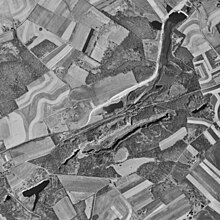Peach Bottom, Pennsylvania | |
|---|---|
Unincorporated community | |
| Coordinates: 39°45′03″N 76°13′33″W / 39.75083°N 76.22583°W | |
| Country | United States |
| State | Pennsylvania |
| County | Lancaster |
| Township | Fulton |
| Elevation | 141 ft (43 m) |
| Time zone | UTC-5 (Eastern (EST)) |
| • Summer (DST) | UTC-4 (EDT) |
| ZIP code | 17563 |
| Area code | 717 |
| GNIS feature ID | 1183417[1] |

Peach Bottom is an unincorporated village in Fulton Township, Lancaster County, in the state of Pennsylvania, United States. It lies on the east bank of the Susquehanna River.[2][3]
The original town of Peach Bottom was located across the river in York County. With the construction of the Columbia and Port Deposit Railroad up the east side of the Susquehanna (1866–1868), a station was built on the Lancaster County side, near the mouth of Peters Creek, from which Peach Bottom could be reached by ferry. This was known as Peach Bottom Station.
The Peach Bottom Railway had terminals at both Peach Bottom and Peach Bottom Station; a planned bridge to connect them was never built. The line on the east side became the Lancaster, Oxford and Southern Railroad and on the west side, the Maryland and Pennsylvania Railroad.
When the Conowingo Dam was built (1926–1928), the Columbia and Port Deposit was relocated higher up the hillside, and both Peach Bottom and Peach Bottom Station were submerged. The present village was built a short distance southeast of the site of Peach Bottom Station.
The post office for the area (ZIP code 17563) is named "Peach Bottom" but is located on Pennsylvania Route 272 just north of Wakefield.
The Peach Bottom Nuclear Generating Station lies across the river, on the site of the original town. In 2016, the U.S. Nuclear Regulatory Commission (NRC) estimated that a major fire at the spent fuel pool at the Peach Bottom Nuclear Generating Station would displace an estimated 3.46 million people from 31,000 square kilometers of contaminated land, while a study conducted at Princeton University suggested that the number of displaced people could go as high as 18.1 million people.[4][5] An earlier study from 1975 assessed the nuclear station's ecological impact on fish fauna along the Susquehanna River.[6]
- ^ "Peach Bottom". Geographic Names Information System. United States Geological Survey, United States Department of the Interior.
- ^ McClure, Jim. "The etymology of 'Peach Bottom' is unknown, but its name is everywhere in southeastern York County". York Daily Record. Retrieved December 21, 2020.
- ^ Wilson, Roger B.; Robinson, Donald C.; Morris, James L.; Glenn, David B. (2003). The River and the Ridge: 300 Years of Local History. Delta, PA: Old Line Museum. ASIN B000EABXDY.
- ^ Stone, Richard (May 23, 2016). "Spent fuel fire on U.S. soil could dwarf impact of Fukushima". Science | AAAS. Retrieved May 30, 2016.
- ^ Bergmann, Pamela A.; Pijawka, K. David (1981). "The Socioeconomic Impacts of Nuclear Generating Stations: An Analysis of the Rancho Seco and Peach Bottom Facilities". GeoJournal: 5–15. doi:10.2307/45185165. ISSN 0343-2521.
- ^ DENONCOURT, ROBERT F.; ROBBINS, TIMOTHY W.; HESSER, ROBERT (1975). "RECENT INTRODUCTIONS AND REINTRODUCTIONS TO THE PENNSYLVANIA FISH FAUNA OF THE SUSQUEHANNA RIVER DRAINAGE ABOVE CONOWINGO DAM". Proceedings of the Pennsylvania Academy of Science. 49 (1): 57–58. ISSN 0096-9222.
